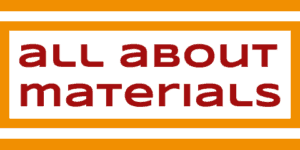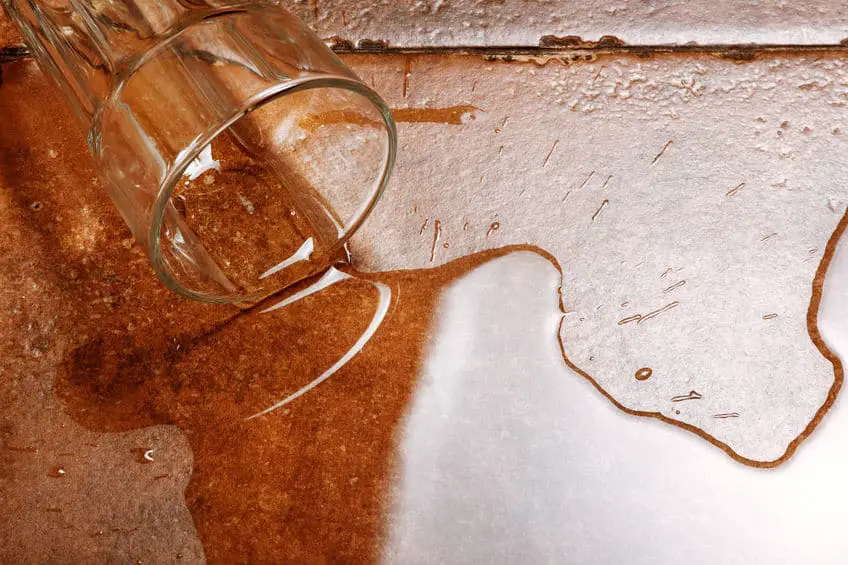This post contains affiliate links.
There will be rooms and spaces that will warrant the need of using a flooring that is both waterproof and scratch-proof. If you, for example, own dogs in your house, your floors should have high scratch-resistance that can stand up well against possible scratches and dents that their claws could make. The flooring should also be water-resistant, giving you enough time to wipe off their urine before it can cause permanent damage.
Other spaces that may require the same kind of flooring could be a mudroom, kitchen, home workshop, garage, public shower rooms, and any other rooms that will be exposed to high amounts of moisture, and traffic or activities. The right flooring for these kinds of spaces should both have high water-resistance and high scratch-resistance qualities to last a long time.
Check out my other related articles, that might also interest you:
The list of flooring below includes floors that are both waterproof and scratch-resistant. Before you proceed to the list though, you first need to understand the difference between the terms waterproof and water-resistant flooring, and also the difference between the terms scratch-proof and scratch-resistant flooring.
What is the Difference Between Waterproof and Water-Resistant Flooring?
Waterproof floorings are floors that are made from materials that do not get affected by high water or high moisture exposure while water-resistant floorings are floors that can resist water or any non-corrosive liquids for just a limited amount of time before it starts getting damaged.
Except for highly corrosive liquids, waterproof floors will not swell, warp, or bloat even when submerged for long periods of time to any type of liquid. Water-resistant floors, on the other hand, will eventually swell, warp, or bloat when their water-resistance limit has been reached. The length of time water-resistant floors are kept protected against non-corrosive liquids varies from product to product and from situation to situation.
What is the Difference Between Scratch-Proof and Scratch-Resistant Flooring?
Basically, the difference between scratch-proof and scratch-resistant flooring is very much like how you define the terms waterproof and water-resistant in flooring.
When it comes to scratch-proof floors though, there are no true scratch-proof floors yet and most of them are actually just high scratch-resistant flooring. They can still be scratched when done deliberately, with the right material and using the right amount of force.
With that in mind, the list of flooring below include floors that are waterproof and are also high scratch-resistant at the same time.
8 Best Waterproof and High Scratch-Resistant Flooring
1. Ceramic / Porcelain Tiles
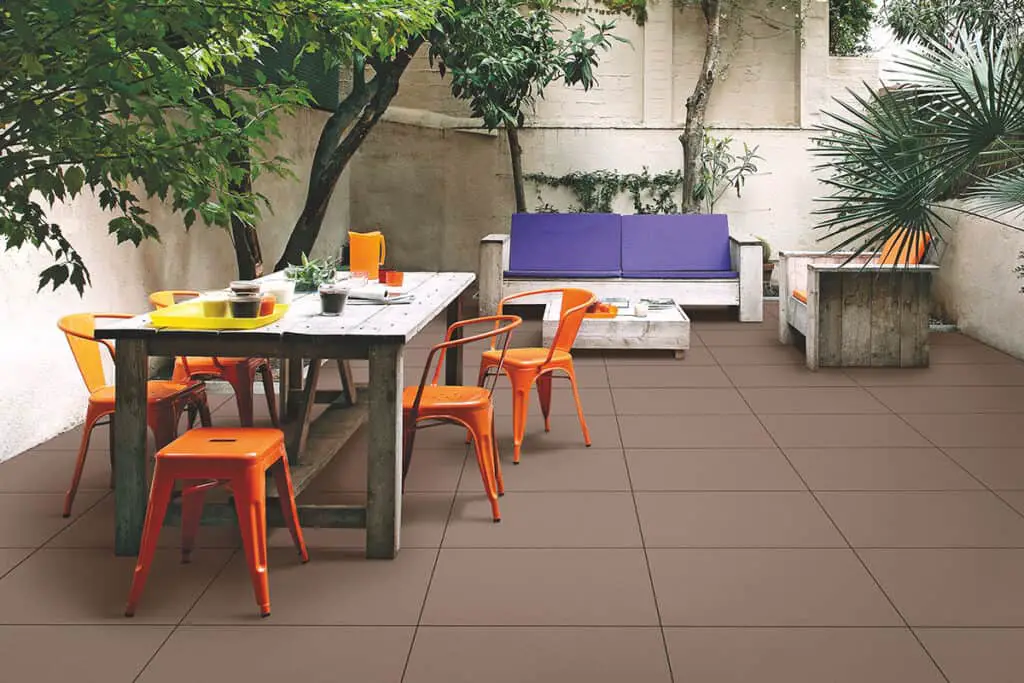
PROS
- Hard-wearing.
- Very easy to clean.
- At a low price point.
- Porcelain tiles has non-slip options.
- Available in a variety of styles to choose from.
- Has options for wood and stone styles.
- Works well with underfloor heating system.
- High scratch-resistance.
- Dent proof.
CONS
- Glazed ceramic tiles can be slippery when wet.
- Hard and cold to the touch.
- Not DIY friendly.
- Improper installation can cause tiles to chip or break off.
Ceramic and porcelain tiles are flooring which are made from a mixture of clay minerals, sand, and water, baked and hardened into a durable material. Both ceramic and porcelain tiles are hard-wearing floors and will last with the proper care and maintenance. Cheaper tiles can last for up to 20 years but higher quality products could go for up to 100 years.
Porcelain tiles are a harder and denser variant of ceramic tiles, although they almost look the same, porcelain tiles are better suited for high-traffic areas. Most high-end tiles are porcelain, though higher priced than ceramic tiles, they are still relatively cheaper compared to other flooring options.
You can usually identify them visually by the tile edges. Porcelain tiles have a sharper-edged cut profile, while ceramic tiles tend to have a rounded-edged cut profile. They also tend to be more consistent in size tile to tile compared to ceramic tiles, which makes it possible to install them with thinner grout lines. Porcelain tiles basically are a higher, much-upgraded version of ceramic tiles.
Both of them are hard and cold to the touch, but you can install underfloor heating to compensate for that. Both have high-scratch resistance and will work well in houses with pets. They can’t get dented as well.
They are not DIY friendly though and you would have to hire someone experienced to install these for you. An improper installation can cause the ceramic or porcelain tile flooring to chip-off or break in the future.
Both are very easy to clean, and usually only needs a quick sweeping or vacuuming to keep it clean. Avoid using very harsh chemicals on cheaper tiles as it can thin out the top coating and wear the tiles faster.
Both ceramic and porcelain tiles are aesthetically versatile and are available in a multitude of designs, colors, textures, and sizes. They can even be used as good alternatives to wood or stone floors as they are also available in excellent looking wood and stone finishes. You can definitely use them in rooms that calls for a wood floor but has to be both waterproof and high scratch-resistant at the same time.
Most ceramic tiles are glazed and can be slippery when wet, but porcelain tiles offer non-slip options that has very good traction even when wet. They can even be installed outdoors.
2. Vinyl Flooring
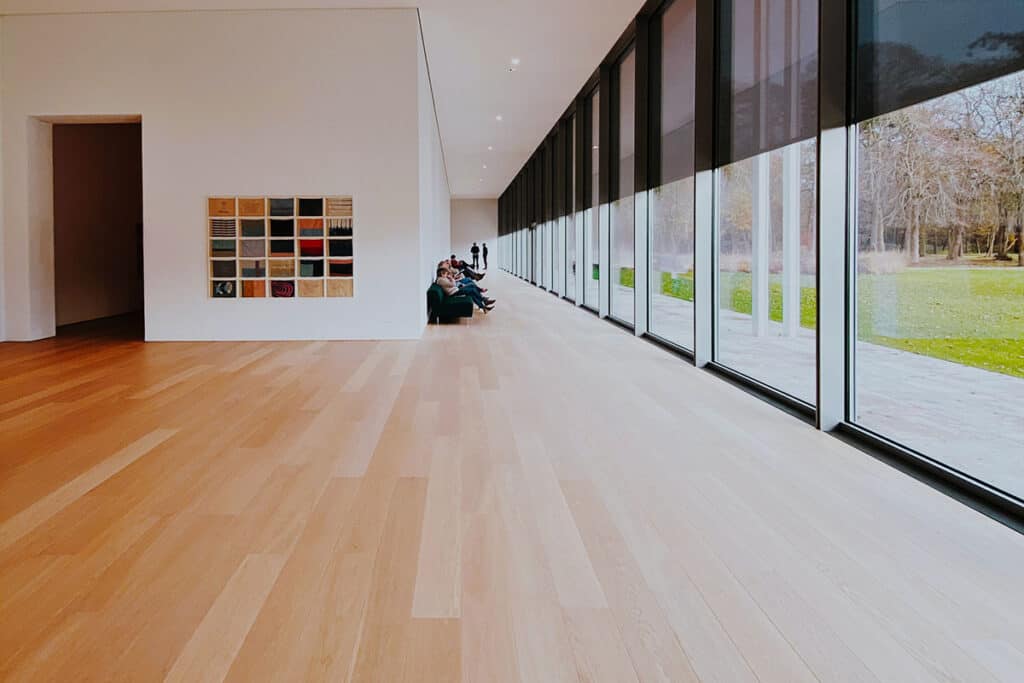
PROS
- Resilient.
- Very easy to clean.
- Non-slip.
- DIY friendly.
- Available in a multitude of colors and designs.
- Has options for realistic wood and stone look and texture.
- At a low price point.
- Works well with underfloor heating.
- High scratch resistant to a certain degree.
CONS
- Can telegraph bumps and uneven surface of the subfloor if the installation is not done correctly.
- Can get permanently dented.
- Cheaper products can fade overtime.
Vinyl flooring is a fully synthetic resilient flooring material made mostly from polyvinyl chloride or (PVC), which makes vinyl floors 100% waterproof. Vinyl floors are available in several variants and they can be called differently by different manufacturers, but they are commonly known as vinyl sheets, vinyl tiles, luxury vinyl planks (LVP), luxury vinyl tiles (LVT), and rigid core vinyl floors.
They are one of the cheaper floor options you can use. They are not only waterproof but vinyl floors also have high scratch-resistance. They are also DIY friendly, which means anyone can easily learn how to install these themselves.
Except for the rigid core types, vinyl flooring is relatively thin and flexible. This can be a concern if you have an uneven or imperfect subfloor, and without the proper preparation, these imperfections can telegraph to the vinyl floors when installed.
Since vinyl floors are resilient, they have a bit of a “give”. In most cases, they usually bounce back to their original shape, but they can get permanently dented if a heavy object, like a piece of very heavy equipment, is placed over a concentrated point on the floor.
Although cheaper products tend to fade faster, they can last up to 10-20 years. Most higher-quality vinyl floors, like the luxury vinyl flooring, can last much longer.
Just like ceramic and porcelain tiles, vinyl floors are aesthetically versatile and are also available in a multitude of colors, designs, and textures. They are also a good alternative to wood and stone flooring as they have options for excellent-looking wood and stone designs. Unlike ceramic and porcelain tiles, they can be installed directly edge to edge without the need for grouting.
Use vinyl sheets if you want a seamless-looking floor. They are usually used in high-traffic commercial areas such as in hospitals, or schools.
Luxury vinyl floors, the LVPs and LVTs, are popular options for homes as they have great options for realistic-looking wood designs, best for homes that need waterproof and high scratch-resistant flooring. These are available in a flexible peel-and-stick system or with rigid cores that are snapped together and can be installed as a floating floor.
3. Concrete Flooring
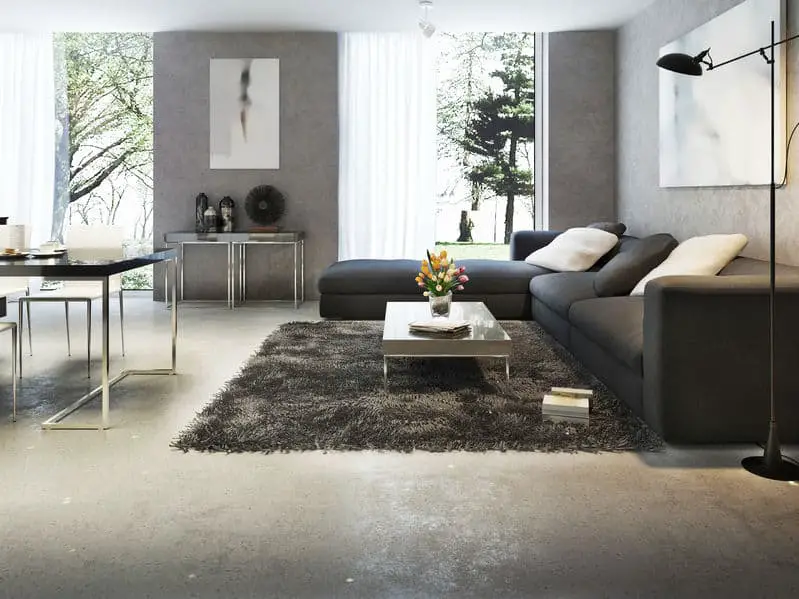
PROS
- Extremely durable and hard.
- Will last a lifetime when maintained well.
- Very easy to clean.
- Will work with an underfloor heating.
- High scratch-resistance.
- Dent proof.
CONS
- Hard and cold to the touch.
- Depending on the top coat, it can be slippery when wet.
- Limited in the design aspect.
Concrete floors are commonly used for spaces with a minimalist, modern, or industrial type designs. They are extremely durable and hard and if maintained well, can last the lifetime of your house or structure.
Concrete floors need to be sealed to make them stain-proof as well, but they are 100% waterproof and will not get damaged even if submerged for a long time. There are different types of coating that can be applied on concrete floors, there can be some types though that can make the floors slippery when wet.
They are also hard-wearing and have high scratch resistance, which makes them one of the perfect floors to use for high-traffic areas. They are also dent-proof and can withstand any high-impact activities. You can use these floors for a home workshop or home gym.
Although they are usually grey in color, you can actually mix in other colors in the concrete mixture to give the floor a bit of character. Concrete floors can be painted for a more customized looking design.
Concrete floors can also be polished, sand-blasted, or stamped with a specific pattern to add some texture.
Concrete floors are hard and cold to the touch, but you have an option to install underfloor heating to compensate for that.
4. Exposed Aggregate Concrete Flooring
PROS
- Extremely durable and hard.
- Will last a lifetime when maintained well.
- Adds a touch of spa-like aesthetic.
- Will work with an underfloor heating.
- High scratch-resistance.
- Dent proof.
CONS
- Can be hard and cold to the touch.
- Needs a professional to do this flooring properly.
- Can be slippery when wet.
Exposed aggregate concrete flooring is very similar to the concrete flooring option. These floor type adds a top layer of a mix of cement and exposed small stones or pebbles that is reminiscent of a rustic spa-like aesthetic.
You’d need to have an experienced professional to do this for you to make it look good. You can have design floor patterns, combining different colors of stone or pebbles, with a different tint of colors of concrete.
With a hard-wearing, waterproof, and high-scratch resistant surface, it too can last a lifetime if maintained well.
This flooring can be hard and cold underfoot but you have an option to add an underfloor heating system to address this.
Also, make sure you use the right kind of top coating as a wrong type could make the floor slippery when wet.
5. Epoxy Floor Coating System
PROS
- Extremely durable and hard.
- High scratch-resistance.
- Dent proof.
- Hard-wearing.
- Non-slip.
- Will last a lifetime when maintained well.
- Style and look can be customized.
- Very easy to clean.
- Can withstand highly corrosive chemicals.
- Works well with underfloor heating.
CONS
- Needs a professional to apply this system properly.
Epoxy floor coating system is a chemical coating that is usually applied over concrete. The coating dries into a very hard and durable surface that is high scratch-resistant and dent-proof. It is 100% waterproof and can also resist highly corrosive chemicals.
It is hard-wearing and non-slip, perfect for high-traffic areas. It can also be installed in space with high-impact activities such as in gyms, industrial spaces, home garages, and home workshops.
It is very easy to clean and maintain, usually a quick sweep or vacuum, and infrequent damp mopping, is all it needs to keep it looking new.
You’d need a professional to apply this coating for you. An improper application can cause it to chip off, peel, or crack in the future.
The look and design of epoxy floor coating can be customized. You can combine colors to make it look like stone or give it some metallic finish.
6. Natural Stone Flooring
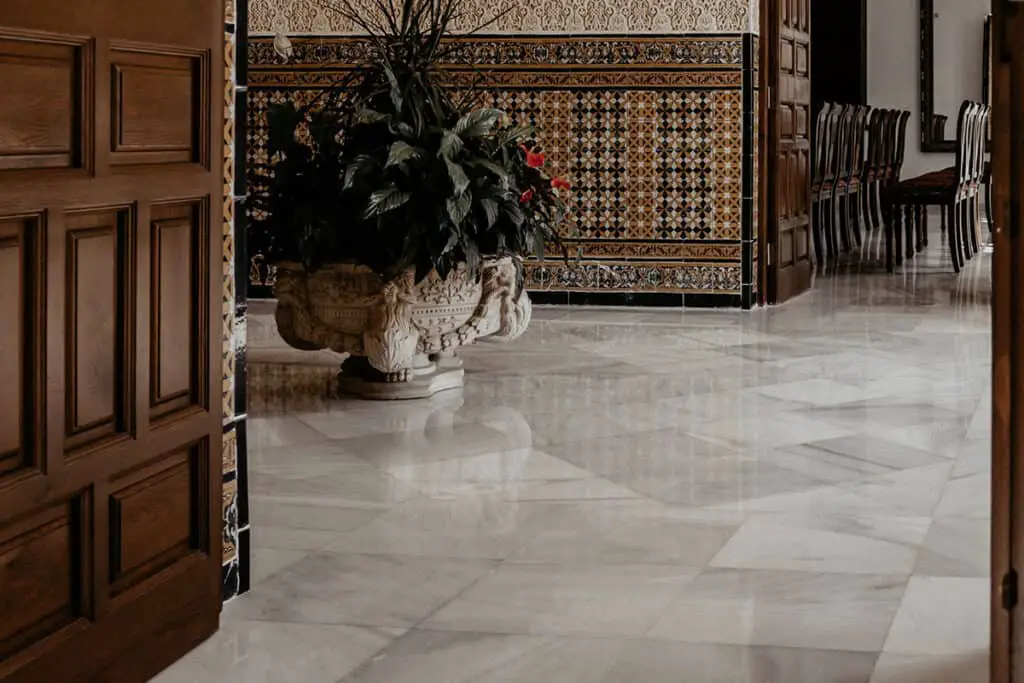
PROS
- Durable and hard.
- Most hard stone type have high scratch-resistance.
- Hard-wearing.
- Will last a lifetime when maintained well.
- Elegant looking.
- Has an excellent resale value.
- Very easy to clean.
- Will work with underfloor heating.
CONS
- Can be slippery with a very smooth finish.
- Hard and cold to the touch.
- Expensive.
- Not DIY friendly.
- Softer stone types can get scratched.
Natural stones are one of the natural materials that have been used as a building finish for both exterior and interior applications. As flooring, natural stones are durable, and hard-wearing and can outlast the life of the house or building. They can give a touch of elegance and luxury in any space.
They can have high upfront costs, but the low upkeep costs make up for it. The resale value of properties with natural stone flooring are even excellent making your investments well worth it.
The natural occurring patterns natural stones make is what makes it unique and beautiful. Unless they were cut so close to each other, the patterns of each cut tile or slab is unique only to its own and will not be identical to any other piece, just like a person’s fingerprint.
Natural stone flooring are 100% waterproof and will not get damaged by high moisture exposure. Being porous, they can get stained that is why they are usually applied with a sealer to make them impermeable to water or any liquid, giving them protection against stains. Typically, and depending on the amount of traffic, you’ll need to reseal stone flooring once every 5-10 years.
There are hard and soft variations of natural stones available. Typically, high scratch-resistant natural stones are those of the hard variety such as marble, granite, travertine, and limestone.
They can be cut into any size, from as big as 3 meters in length to as small as your typical 60cm x 60cm tile size. They are not a DIY friendly flooring though and you would need some professionals to install these for you.
Cleaning natural stone floors are very easy, while there’s a periodic resealing every 5-10 years, there’s no other maintenance needed to keep it in good condition.
They can be cold underfoot but just like the other floor types, you can install an underfloor heating system to address this.
Some polished stone floors can be a bit slippery but you can have them textured or honed to give them a bit of traction.
7. Terrazzo Flooring
PROS
- Extremely durable and hard.
- Hard-wearing.
- Will last a lifetime when maintained well.
- Style and look can be customized.
- Very easy to clean.
- Will work with underfloor heating.
- High scratch-resistance.
- Dent proof.
CONS
- Can be expensive.
- Depending on the top coat, it can be slippery when wet.
Terrazzo flooring is a composite material made from a mixture of various stone chips, aggregates, glass, and other suitable decorative material which are all then combined in a cementitious binder. It is usually poured in place and left to harden into a seamless flooring but there are also tiled versions available that can be installed just like how you install ceramic or porcelain tiles.
Terrazzo flooring, especially the poured type, is extremely durable and hard-wearing. It is also 100% waterproof and has high scratch resistance. Since a big portion of it is also concrete, has very similar properties as concrete floors. It can be used for interior and exterior applications.
It is fairly easy to clean and to maintain. Since it’s partially concrete, you will also need to apply a sealer to protect it from staining. And depending on the traffic it is exposed to everyday, you will need to reapply the sealer periodically. It will last a lifetime as long as it is well maintained.
The design and look of terrazzo flooring can be customized and can be made to match the look of your space.
8. Waterproof Laminate Flooring
PROS
- DIY friendly.
- One of the cheap options.
- Has design options that look like real wood or stone.
- High scratch resistant to a certain degree.
CONS
- Can get permanently dented.
Standard laminate flooring is water-resistant to a certain degree but they are not 100% waterproof and can’t be used for spaces that are exposed to extreme moisture. With an attempt to expand their market, some manufacturers developed and produced waterproof laminate flooring. Although some of the available products have elements in them that can still be damaged by water, when properly installed, the flooring system will remain watertight and waterproof.
Standard laminate flooring has a core made from plywood, which makes it vulnerable to water damage, waterproof laminate flooring on the other hand has a core made from either synthetic material or composite material that gives the core high resistance to water damage. The locking system was also changed to make it more watertight and impermeable to water penetration.
Each waterproof laminate flooring from manufacturers is different and may perform differently from one another but all of them guarantee that their products are 100% waterproof, and also have high scratch-resistance. Most of them also offer lifetime warranties for residential applications. The costs are still affordable and are not far from what standard laminate flooring costs, which is around $2.50 – $10.00 per sq. ft.
Like standard laminate flooring, they can still get permanently dented by a heavy object, like a furniture or equipment.
Waterproof Laminate Flooring Brands
Below are some of the brands that offer waterproof laminate flooring:
What is the Most Durable Waterproof Flooring?
Referring to the list above, the flooring that is the most durable and waterproof at the same time is the epoxy floor coating system. Concrete flooring, terrazzo flooring, and exposed aggregate concrete flooring come in second.
All About Materials is a participant in the Amazon Services LLC Associates Program, an affiliate advertising program designed to provide a means for sites to earn advertising fees by advertising and linking to Amazon.com. We also participate in other affiliate programs which compensate us for referring traffic.
